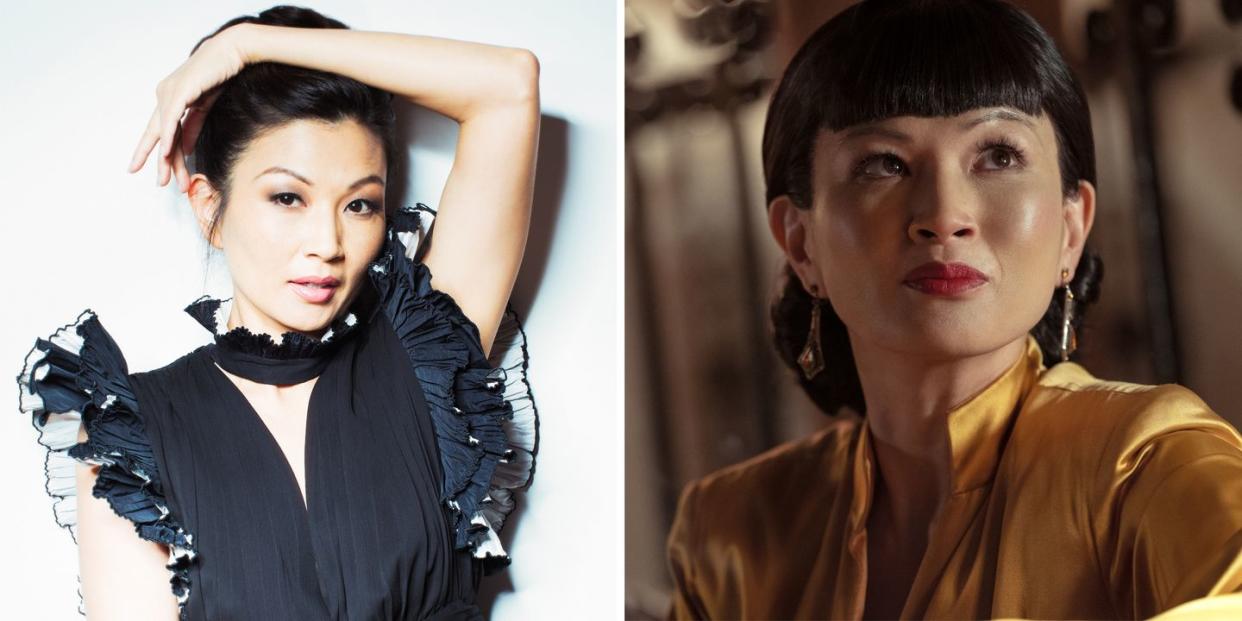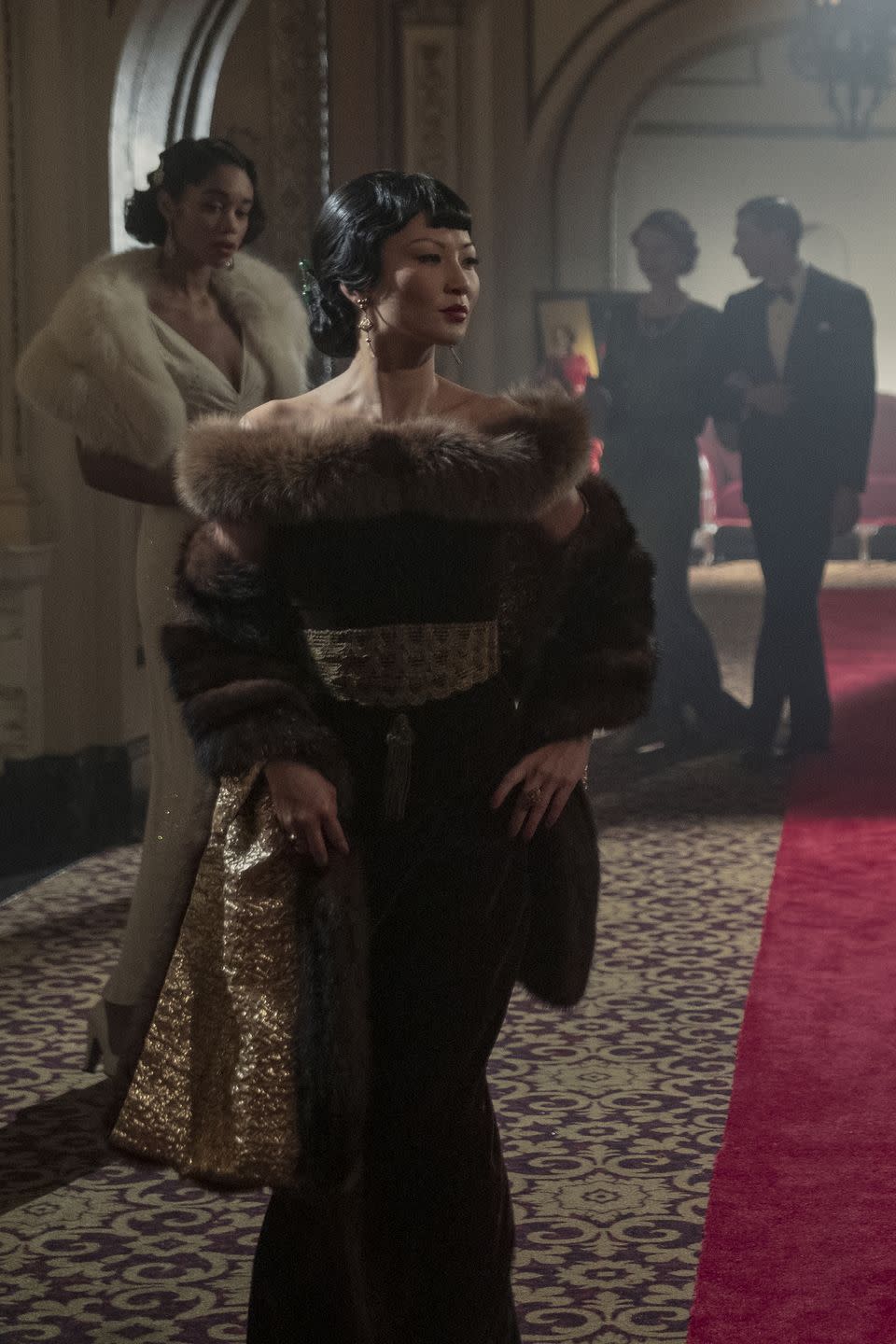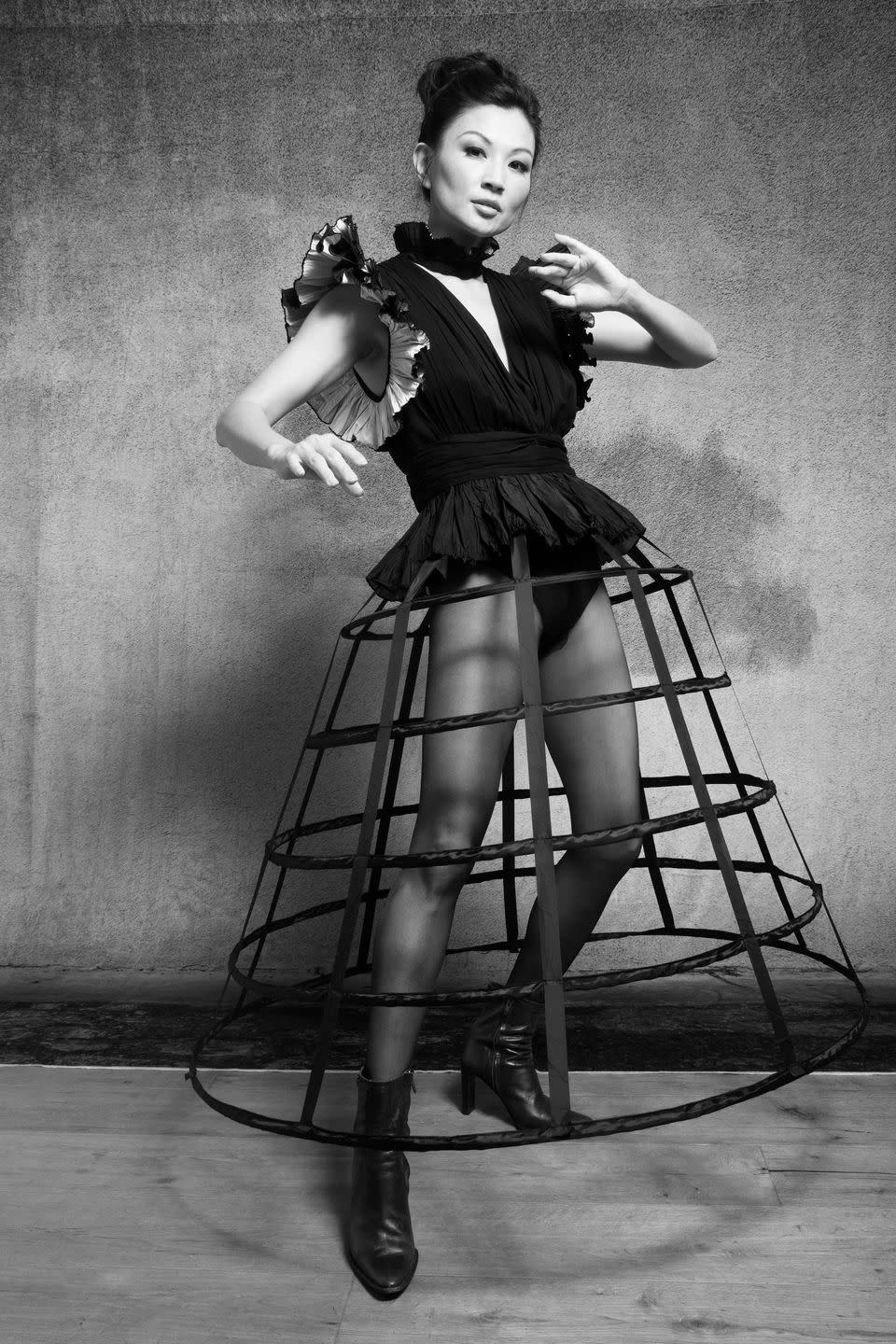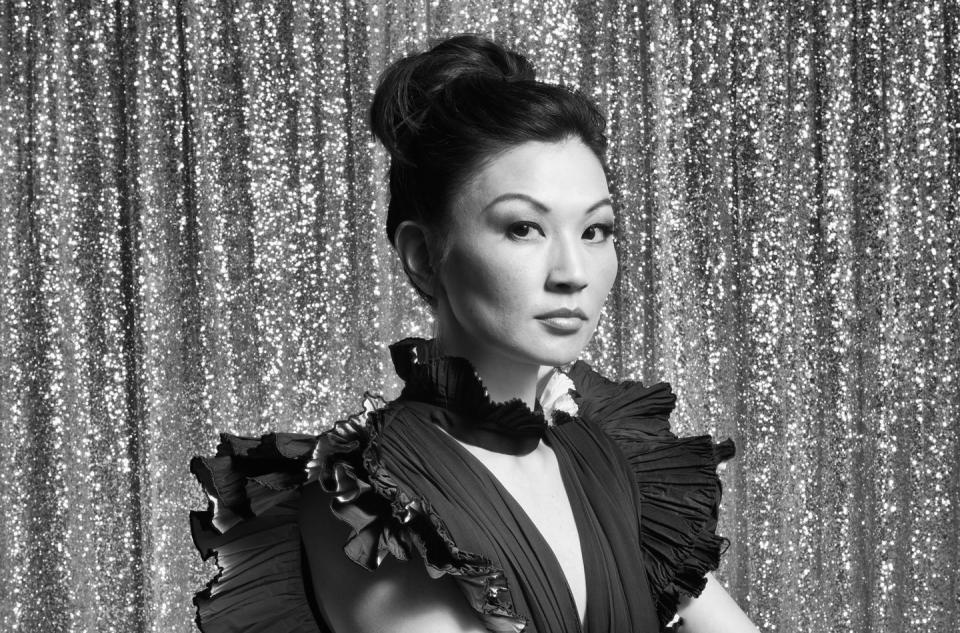Hollywood's Michelle Krusiec: Anna May Wong Is "Not Your Mommy's Asian"

Most characters on Hollywood are fictional, but Michelle Krusiec was one of the lucky few cast members to portray an actual historical figure: Anna May Wong, known as the first Asian-American movie star.
Wong, who was born in California, frequented the silver screen in the ‘20s and ‘30s, but she was mostly side-swept to fetishized, subservient parts while white actresses in yellowface played lead Asian characters. The worst instance was probably when she was passed over for a Chinese lead in The Good Earth for German actress Luise Rainer, who won an Oscar for the performance. Wong was offered the role of the concubine.
Hollywood, now on Netflix from Ryan Murphy and co., tries to reimagine Wong’s story with the recognition she deserves. She appears later in her career, jaded from the pigeonholing and stereotypes imposed on her by the industry, when she’s approached by an aspiring director (Darren Criss’s Raymond Ainsley) offering her a supporting role—as a famous entertainer, not an exotic temptress—in his upcoming film. In the end, she wins a Supporting Actress Oscar for the part, something the real Wong was never able to achieve.
“I really felt like I was winning that Oscar for her,” Krusiec recalls of shooting that big Academy Awards scene, which happened to take place on an anniversary celebrating Wong in real life. “I don't want it to sound too heebie-jeebie, but I felt like she was kind of present and she was getting the moment she deserved through this story,” she adds. “It felt very healing. It felt cathartic.”

Krusiec—who starred in Alice Wu’s Saving Face, Karyn Kusama’s thriller The Invitation, Hawaii Five-0, and more—was understandably intimated by the role when she first heard of it, but she covered her bases. She researched by reading Wong’s biography by Graham Russell Gao Hodges and other books, watching documentaries, and searching for sound recordings of the actress’s voice from the time period. She went full 1940s to her audition—with a wig and all—and hired a dialect coach to learn the mid-Atlantic accent standard to films at the time. She didn’t get in touch with Wong’s surviving family because they’re so private.
Through Wong's vintage glamour shots, it’s easy to deduce that she was an elegant star and fashion icon, but Krusiec was surprised to learn from her research that the actress was a “real party girl” as well. She ran cabaret shows throughout Europe. She was a frequent photographer’s muse. There were rumors that she was in a relationship with Marlene Dietrich. “And if it's true that she was bisexual or a lesbian, I think that's even cooler,” Krusiec adds. “She's not your mommy's Asian. She's today's Asian.” A longtime heavy drinker, Wong died at age 56 from a heart attack, following liver disease.
While socially distancing in Echo Park with two young kids, Krusiec talked to BAZAAR.com about bringing an Old Hollywood legend to life in a new light.
How does it feel, first of all, actually knowing that Hollywood is finally out now?
That's a great question because I secretly have not watched the ending.
So do you know how it ends?
Oh yeah. I know how it ends. But shooting that whole Oscar sequence was such a dream. It was such a surreal dream. The actual shoot itself took so long because there were so many different actors with so many different schedules and it was such a complicated shoot that it was over the course of maybe six or seven days. I think there's a part of me that doesn't want to end that experience. I feel like once I see it, then that'll be the end of all of it. I think there's a part of me that's kind of really enjoying this wave of Anna May Wong celebration and the anticipation is exciting and the press around it has been so, has been so positive and receptive. I just don't want it to end.
I was reading up on her and I didn't realize that as a child she was ridiculed and experienced racism to the point where she had to change schools. So this is something that's been a constant struggle for her even ever since she was a little girl.
That for me, I thought, just being a woman and a person of color and having experienced racism growing up, it really scars you and it really traumatizes you. And those scars do irreparable damage. And the idea that she overcame all that to be the star that she was ... I have so much admiration. During that time there wasn't really self-help. There wasn’t was psychology, there wasn't this kind of wokeness that you could turn to and talk to somebody about being progressive or open-minded. The fact that she could face all of that and rise to what to the success she did rise, for me, that was profound because her spirit must have been so strong. But I do think that in the end it did break her. One person can only withstand so many slights against the psyche.
Was there anything that you could relate to her about?
I think that was why I felt in the end I could play her because coming into it, I was very daunted by the idea of stepping into this icon. You have of course all these insecurities of, Can I play this incredible legend? When I felt like her story was so similar to my experience of what I have had, what I've gone through in terms of just being a woman of color in this industry, it didn't feel so far off. So little of it has changed that I thought, "Oh, well I get this." I mean, you still can't star opposite of a white guy in Hollywood in a big feature, you know? You're relegated to parts that seem "right." Half the cast would be Asian or it's an all-Asian cast and it's set in Asia. So that makes sense. There are a lot of things that have to “make sense” for Asians to be cast in these big Hollywood blockbusters. In the indie realm, I think there are filmmakers that are creating representation for people, but we're looking at really just the kind of standard Hollywood films and the way the big industry looks at it. I felt like that has not changed and it's been over a hundred years.

What did it mean for you when you were giving that Oscars acceptance speech?
When I was going into the process, I had a hard time figuring out how to spin her story in a positive way. Like what could I say about her, about her life, that didn't feel so depressing and such a downer. 'Cause it really was tragic. It's that kind of an underdog story where the underdog fights and fights and then they have this miraculous moment and then they're finally the winner. She never had that. For me, winning that Oscar, it was being given to her, and I felt like it was giving me a second chance at believing in change.
I definitely am a little jaded, when it comes to, When will real change happen and will I witness that? And while I think it is great to be optimistic and hopeful and to continue your perseverance as a person in what you're doing, there is another part of me that doesn't actually know when that change is going to happen and you see signs of it. And to have Ryan do something like this felt like it was really challenging my belief system. I was not thinking that this would be possible. The idea that those wrongs could be righted, that is a really powerful concept and he's really asking for people to recognize these mistakes in history, and can we take those who are in power and have those people really stand up for those who are disempowered. And that's a really powerful question. For me to see that, to be a part of that was really, rejuvenating for me as an artist.
The Oscar scene also made me think back a little bit to earlier this year when Parasite won Best Picture and did a whole sweep; and The Farewell, which also had an Asian cast and had a female Asian director, won Independent Spirit Awards; and Awkwafina won a Golden Globe. Did any of those moments stick out to you as you were preparing for that scene or getting into character?
Well, definitely the whole swath of it for sure. I mean, it's starting from Sandra Oh talking about "what an honor it is to be Asian." I felt like the tide began there, just to have her, who's been doing it for so long, be recognized. I feel like there was a channel that was opened by her win and then everything else. I have been kind of shocked because even with Parasite I was huge fan of Parasite; I was surprised by that one. I was so taken aback by that one. I was certain, you know, like 1917 was going to win. [Laughs] So that really did stump me. Like I said, I think, I think I'm in this weird shock and awe right now of like, could this possibly be ... is this more than just a moment? I certainly hope it is, but there is a part of me is who is in disbelief that this is more than just a moment. Like I'm waiting for the other shoe to drop.
And, this isn't what your article is about, but, COVID-19, the "Chinese virus," the anti-Asian racism and the hate—to me, that's the other shoe dropping. I'm not surprised by that. Of course they're going to blame Chinese people, you know? We get the rug pulled out from under us so quickly and I'm used to that, unfortunately. So to answer your question, I hope that this continues, but there's a lot of signs that always tell me that it never lets me let up from being vigilant, if that makes any sense.

It is worth being discussed, the issues of anti-Asian racism, because we're seeing a lot of that unfortunately right now. Was it significant for you to be a part of a positive Asian-American narrative in this time?
Yes. I think it's very important because listen, Hollywood is a really powerful place. We export our culture to the rest of the world and that's one of our huge moneymakers. And it's also tied with the American value system of, everyone can make it. And when you have a story like Anna May Wong who is quintessentially American in everything that she strived for and she's not allowed her place in history and she's not been given that which was afforded every other American, which is the ability to actually pursue your dreams to accomplish it, and you take that away and then you give it back to her, I think it's really important because it means that Hollywood is recognizing and putting out stories of change.
So the idea of me being able to be part of that story, which is changing the narrative, reframing the conversation as to how Hollywood can now help people continue in the idea of making dreams happen, I think that is a great new platform to be a part of. And I believe it's the thing that people have always looked Hollywood to do, which is to inspire us and motivate us and to really push us into believing that we all do have a voice and we have a purpose. If you choose it. I think that's part of the American dream, part of the American ideal: The underdog can win.
This interview has been edited and condensed for clarity.
You Might Also Like

